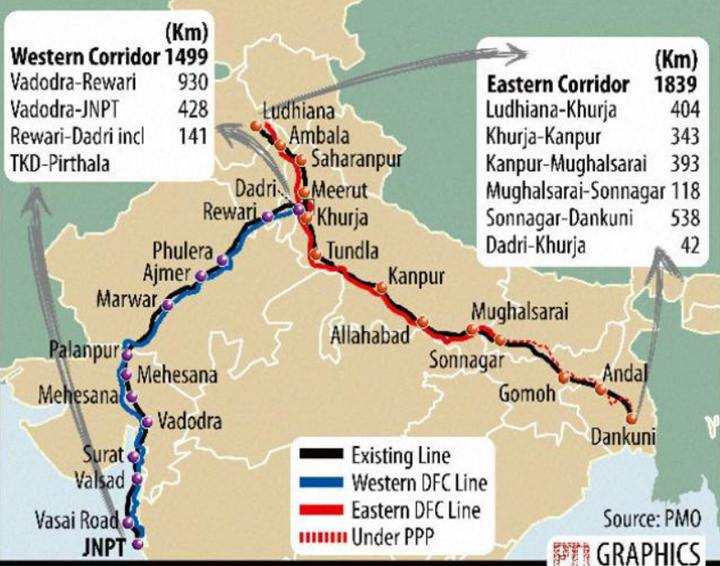Why in news?
The much-delayed project to build the ambitious eastern and western dedicated freight corridors has received a boost with the Cabinet Committee on Economic Affairs approving a revised cost estimate for it.
About Dedicated Freight Corridors:
Dedicated Freight Corridor Corporation of India Ltd., the special purpose vehicle set up by the Railways to implement the project, is keen to complete it by 2017-18. Once the twin-corridor system is in place, it will transform the very profile of the Railways.
Western FC:
Eastern FC:
Need:
The much-delayed project to build the ambitious eastern and western dedicated freight corridors has received a boost with the Cabinet Committee on Economic Affairs approving a revised cost estimate for it.
About Dedicated Freight Corridors:
Dedicated Freight Corridor Corporation of India Ltd., the special purpose vehicle set up by the Railways to implement the project, is keen to complete it by 2017-18. Once the twin-corridor system is in place, it will transform the very profile of the Railways.
 |
| Source: The Hindu |
Western FC:
- The western corridor will cover nearly 1,500 km, connecting the Jawaharlal Nehru Port near Mumbai with Dadri (UTTAR PRADESH)
- Passes through States such as Haryana, Rajasthan, Gujarat and Maharashtra.
- A substantial portion of the revised cost will be met by way of debt from multilateral institutions such as the Japan International Cooperation Agency and the World Bank.
Eastern FC:
- 1839 km
- will connect Ludhiana in Punjab with Dankuni in West Bengal.
- It will cut across six States:
- Punjab
- Haryana
- UP
- Bihar
- Jharkhand
- West Bengal
- It will have two components, a double-track section and a single-track segment, both electrified.
- The eastern corridor will cater to traffic streams including coal, finished steel, cement and fertilizer.
Need:
- For high GDP growth, lot of electricity is needed, for which coal needs to be transported from mines to thermal power station -- need for an efficient mechanism for the same
- Growth in infrastructure (bridges, roads, buildings) needs faster transport of raw materials like cement, steel, machinery.
- Growing international trade via oceans needs quick transportation of products from factories to ports.
- End-consumers have been forced to pay for the collective inefficiency.
- Reduction in transportation costs
- Stepped-up commercial activity, benefiting a range of core industries
- This could in turn have a multiplier effect on the economy.
- The DFC will have only electric trains -- lesser greenhouse gas emissions
- The passenger traffic and goods traffic will be separated, leading to faster and efficient transport
Why slow progress so far?
- slow decision-making process
- land acquisition
- massive challenge facing policy-planners in pushing through a project of this size and magnitude that has inter-State implications.
[Sources: The Hindu, PIB, Indian Express]

0 comments:
Post a Comment